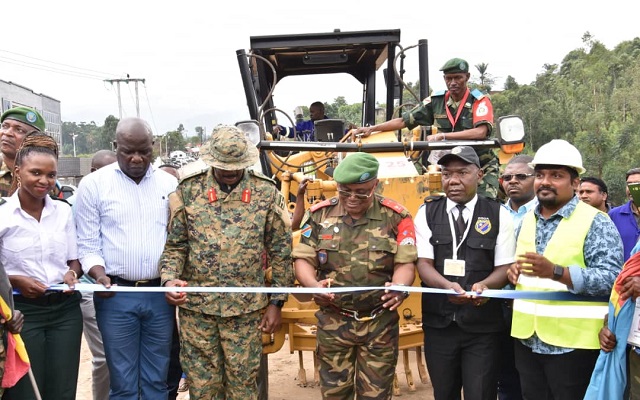
How the UPDF became the anchor of security and diplomacy in the Great Lakes region
Kampala, Uganda | THE INDEPENDENT | What is the impact of Uganda’s contribution to the peacekeeping mission in Somalia? Its intervention in South Sudan in 2013 to stop the violent conflict tearing up the young nation; Its deployments to Democratic Republic of Congo (DRC) in the 1990s and the recent incursion to fight a rebel group there;- the synthesisation of a foreign policy anchored on Uganda’s military.
That is the focal argument of a new paper titled Foreign Policy by Troop Deployment written by Ian Katusiime, a Ugandan journalist working with The Independent. The paper was published in December 2022 by Friedrich Ebert Stiftung, a German political foundation.
“The government of Uganda has pursued an ambitious foreign policy in the region where its military deployments have been the cornerstone of its relations with countries in the East, Central and the Horn of Africa. As a result, Uganda’s international relations doctrine has been a fusion of governance with military might,” the paper’s introduction reads.
“Uganda’s military ambitions have given it the leeway to conduct its regional foreign policy goals that include leading peace missions, acting as mediator in inter-state and intra-state conflicts, drafting peace and security agreements, acting as an interlocutor for great powers and the UN, among others,” the paper adds.
It goes on to add that the troop deployments have also enabled Uganda tout the Uganda Peoples Defence Forces (UPDF) as a model for modern armies beyond the traditional role of protecting the state.
The paper delves into the long history of Uganda’s military ventures in DRC drawing from material in Dancing in The Glory of Monsters a book by Jason Stearns, a renowned Congo researcher; documenting Uganda’s troubles with M23 and the eventual launching of Operation Shujaa, to flush out the Allied Democratic Forces (ADF) who are held responsible for terrorist attacks in Uganda.
Somalia dividend
However the major focus of the paper is on the African Union Transition Mission in Somalia (ATMIS) and how it changed the perception of the UPDF across the continent and beyond. “The mission has been symbolic of the UPDF’s rebirth from the army that engaged in the Congo battles and had an ignominious clash with the Rwandan troops. Those who have commandeered Uganda’s troops in Somalia are a living testament of the mission’s dividends,” it states under the section titled Somalia Dividend.
Here, there are interviews from Maj. Gen. Nathan Mugisha, Uganda’s Deputy Ambassador to Somalia and a former AMISOM (before it was renamed ATMIS in 2022) Force Commander and Lt. Gen. Kayanja Muhanga, the UPDF Commander of Land Forces. At the time of the interview, Kayanja was a UPDF Contingent Commander in ATMIS in December 2017.
“Uganda is doing the heavy lifting. Three quarters of the work in Somalia is on Uganda’s shoulders,” Gen Mugisha is quoted. The author argues that Uganda’s work in Somalia and as the leading troop contributing country has given it sway in the affairs of the Horn of Africa region where Somalia lies.
“Uganda was not resting on its laurels as it basked in international acclaim. Every year, the UPDF was sending a new battle group with a tested commander to lead the Ugandan contingent which occupies Sector 1 in the heart of Mogadishu where the fiercest battles with Al Shabaab have taken place,” the paper states.
The paper also mentions the late Lt. Gen. Paul Lokech who served as UPDF Contingent Commander in Somalia in 2011/2012. “Generals Mugisha, Kayanja and Lokech belong to a special category in Uganda’s foreign policy architecture due to their strategic roles. In 2011/12, the three were all stationed in Mogadishu,” the author points out describing them as the “triumvirate that encapsulated Uganda’s foreign-policy-by troop-deployment archetype.”
Thirdly, the paper zeroes in on South Sudan- a country that Uganda remains closely engaged with. It describes the 2013 UPDF intervention in Juba as “an action Kiir remained indebted to the Ugandan leader for. Kiir has jetted into State House Entebbe for talks with Museveni more than any other regional leader. President Museveni has been the most critical voice on South Sudan matters,” it notes.
Uganda’s role as a guarantor of the landmark South Sudan peace deal signed in 2018 is highlighted. Equally, Museveni’s presence at the graduation of what was billed as the first unified national army in South Sudan in 2022 is mentioned as factors that demonstrate the outsize influence of Uganda on the young nation.
Recommendations
In its recommendations, the paper calls the empowerment of civilian diplomats where troops are deployed. The paper also states that troop deployments “should have fully-fledged diplomatic support to win both the battle and the war. In 2013, Uganda deployed troops to South Sudan without any engagement with Uganda’s mission in South Sudan.” Lastly, the paper recommends the Ugandan government to embark on a global campaign spreading the virtues of peacekeeping missions stating “Uganda’s intervention in Somalia was an extraordinary example of an African-led solution to an African problem.”
 The Independent Uganda: You get the Truth we Pay the Price
The Independent Uganda: You get the Truth we Pay the Price

